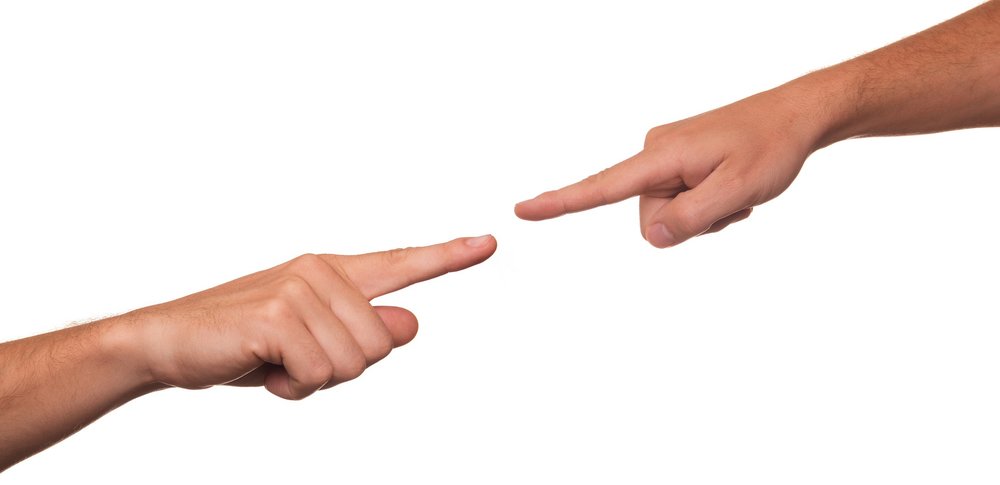
In life, lots of things go wrong for every one of us. What matters is not the event, but what we do with it. Suppose, for example, someone you trusted steals from you and causes you real harm. You have several choices:
1) You can blame the person who cheated you and always believe that, if not for that betrayal, you would have had wonderful success;
2) You can blame yourself and believe that, but for your foolish trust, you would have had wonderful success;
3) You can take responsibility for what happened, evaluate what damage control needs to be done, what steps need to be taken to prevent a similar event in the future, and then move forward.
The first two alternatives focus on blame and the harm that someone has caused. But blame creates weakness where what is needed is strength. It does so because blame implies a victim—in this case, you.
Responsibility, however, is very different. It simply recognizes that everything has a cause and sometimes that cause is something we did or didn’t do. Sometimes it is just an external event like fire or flood. But even then, there may have been something we could have done or avoided doing that would have kept the fire or flood from harming us.
Taking responsibility doesn’t mean you are a victim. It just means that you look at what happened and make decisions for the future. Could I have foreseen what happened and prevented it? If so, how can I avoid that mistake in the future and how can I solve the problems the mistake has caused?
Sometimes, you will realize that you made the very best decision you could have made with the available facts and that choice was just wrong. In that case, looking to blame yourself is not helpful. There is an old saying to the effect that once a cat has been burned by sitting on a hot stove, it will never sit on a stove again. But a wiser cat might instead just make the distinction between a hot stove that could burn it and a warm one that offers warmth and comfort.
If the decision was trusting someone who betrayed you, one choice would be to blame that person and avoid ever being vulnerable to that again by just doing the job yourself next time. A better choice would be to acknowledge that you were the one who made the choice to trust someone who betrayed your trust. But instead of never trusting again and trying to do everything on your own, a better alternative is to try to learn how to prevent the person you trust from doing serious damage if you are wrong. Former President Reagan had a saying in negotiating treaties with potentially hostile governments: “Trust, but verify.” All it really means is to give trust where needed to get a result but build in some protections if the trust is misplaced.
The message in all this is, except perhaps in a court of law, blame is a useless pursuit because it just makes you into a victim. Responsibility, however, gives you power because it reaffirms that, ultimately, you and only you can decide what meaning to give to an event. You own it, so you can fix the problem, takes steps to prevent it from recurring in the future, and learn from it how to recognize and avoid different future, but similar risks.
Let me give you a very personal example. Some time ago I was diagnosed with what is almost always a fatal and fast moving cancer. I was told that an immediate, but dangerous surgery might save my life, but would involve a long and difficult recovery. I was also told that some less drastic actions might also solve the problem, but only if the cancer diagnosis was wrong and that by the time I learned if the diagnosis was right or wrong, it might be too late. Knowing that the chance that what I had was not cancer was only about 5%, I elected surgery.
I was incredibly lucky. Mine was one of the 5% of similar tumors that was not cancer. Great news! Except that I lost a year of my life to recovery. I had two choices: 1) look back and bemoan the fact that I had made the wrong choice, 2) see if there was anything I could learn from the decision process I had used; then just move on with life. I chose #2 and am today happy and productive again instead of unhappy and probably not nearly as productive. Responsibility trumps blame every time.
From The Podcast
Dream Toolbox
Welcome to the Dream Toolbox, a series of short podcasts that are designed to open windows of economic opportunity that most people don’t know even exist and to provide a set of skill based tools that can lead almost anyone from a low-income existence to wealth and financial abundance.Join Podchaser to...
- Rate podcasts and episodes
- Follow podcasts and creators
- Create podcast and episode lists
- & much more
Episode Tags
Claim and edit this page to your liking.
Unlock more with Podchaser Pro
- Audience Insights
- Contact Information
- Demographics
- Charts
- Sponsor History
- and More!

- Account
- Register
- Log In
- Find Friends
- Resources
- Help Center
- Blog
- API
Podchaser is the ultimate destination for podcast data, search, and discovery. Learn More
- © 2024 Podchaser, Inc.
- Privacy Policy
- Terms of Service
- Contact Us
